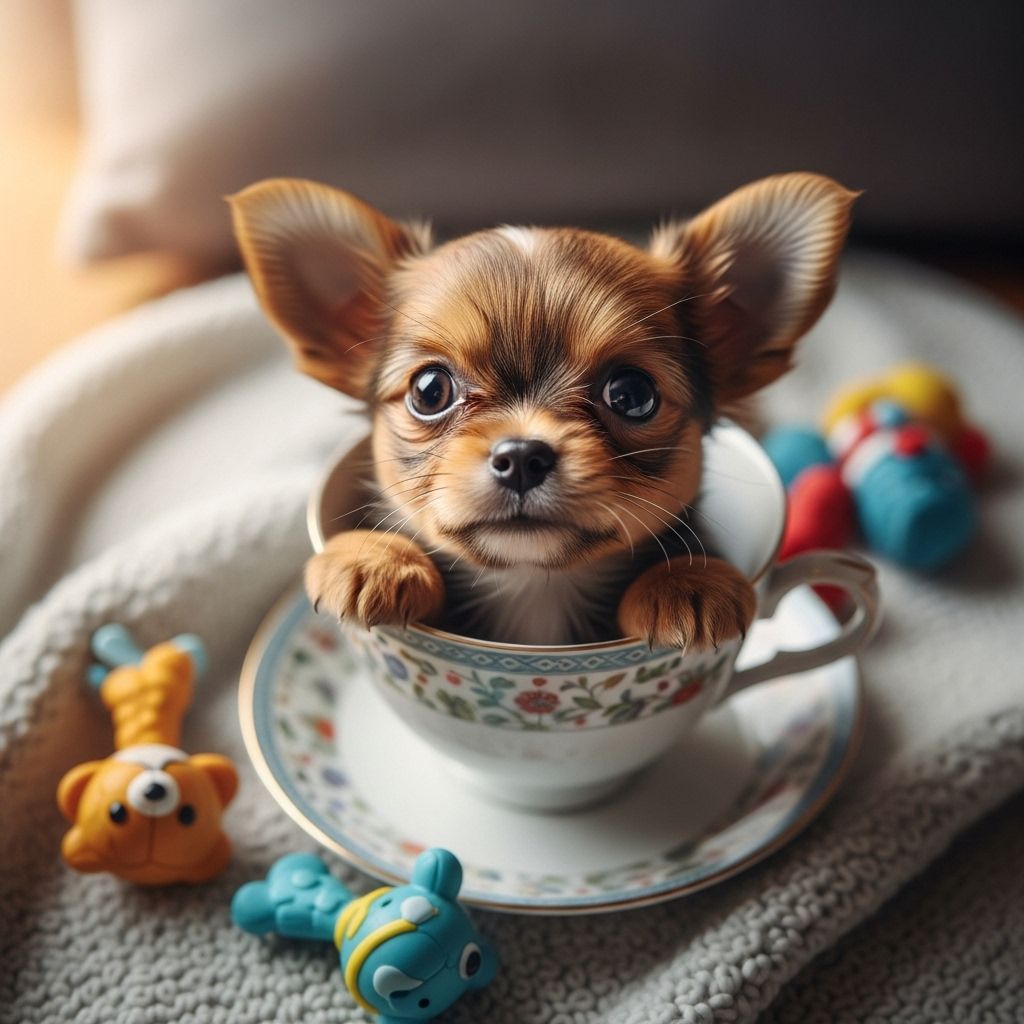The Guide to Teacup Dogs: Care, Types, and More
Tiny companions thrive with tailored support and attentive routines.

Introduction to Teacup Dogs
Teacup dogs, despite not being an official breed recognized by kennel clubs like the AKC, are often referred to as tiny versions of already small dog breeds. They are popular for their cuteness and small size, making them ideal as lap dogs. However, they require special care due to their fragile health and high maintenance needs.
Types of Teacup Dog Breeds
Several breeds are commonly referred to in the ‘teacup’ category, though it’s essential to note that ‘teacup’ is more of a marketing term than a standard size classification. Here are a few popular ones:
- Pomeranian: Originally larger, Pomeranians were bred down to be tiny companions. They are friendly, sociable, and require regular grooming due to their thick coat.
- Chihuahua: As the smallest official breed, the teacup version of Chihuahuas is even smaller. They are confident, loyal, but may require early socialization to prevent fearfulness.
- Maltese: Known for their silky coats and gentle nature, Teacup Maltese are ideal lap dogs. They require regular grooming and are sensitive to stress.
- Poodle: Smart and elegant, Teacup Poodles are popular for their intelligence and low-shedding coats. They need professional grooming and regular exercise.
Care and Training for Teacup Dogs
Caring for teacup dogs involves several key considerations:
- Dietary Needs: Teacup dogs need a diet rich in nutrients to maintain their health. They should eat three to four times a day to prevent low blood sugar. Adding omega-3 fatty acids and vitamins is beneficial.
- Exercise: While they are energetic, teacup dogs tire easily. Short walks and play sessions are ideal, ensuring they don’t overexert themselves.
- Grooming: Depending on the breed, regular grooming may be necessary to prevent matting or tangling of their coats.
- Training: Early obedience training and socialization are crucial to ensure they are confident and well-behaved.
Health Considerations
Teacup dogs are prone to health issues such as hypoglycemia (low blood sugar), dental problems, and bone fragility. Regular veterinary check-ups are essential to monitor their health.
Frequently Asked Questions (FAQs)
Q: Are teacup dogs suitable for families with young children?
A: Generally, teacup dogs are not recommended for households with very young children due to their small size and fragility. However, with careful supervision and gentle handling, some breeds can thrive in family environments.
Q: How long do teacup dogs live?
A: The lifespan of teacup dogs varies by breed but generally ranges from 12 to 15 years, provided they receive proper care and attention.
Q: What kind of exercise do teacup dogs need?
A: Teacup dogs require short, gentle exercise sessions to prevent exhaustion. They are best suited for short walks and indoor play.
Conclusion
Teacup dogs can make wonderful companions for those willing to provide the necessary care and attention. By understanding their needs and characteristics, you can ensure a happy and healthy life for these small but mighty dogs.
References
- https://petlandkennesaw.com/petland-speaks-how-to-take-care-of-teacup-dog-breeds/
- https://worldanimalfoundation.org/dogs/teacup-dog-breeds-with-enduring-charm-and-grace/
- https://www.youtube.com/watch?v=-CD44xd-paM
- https://www.revivalanimal.com/learning-center/how-to-take-care-of-a-teacup-puppy-raising-tiny-dogs
- https://www.petmd.com/dog/general-health/teacup-dogs-puppies
- https://www.torranceanimalhospital.com/site/blog/2022/02/08/truth-about-teacup-dogs
Read full bio of Sneha Tete












